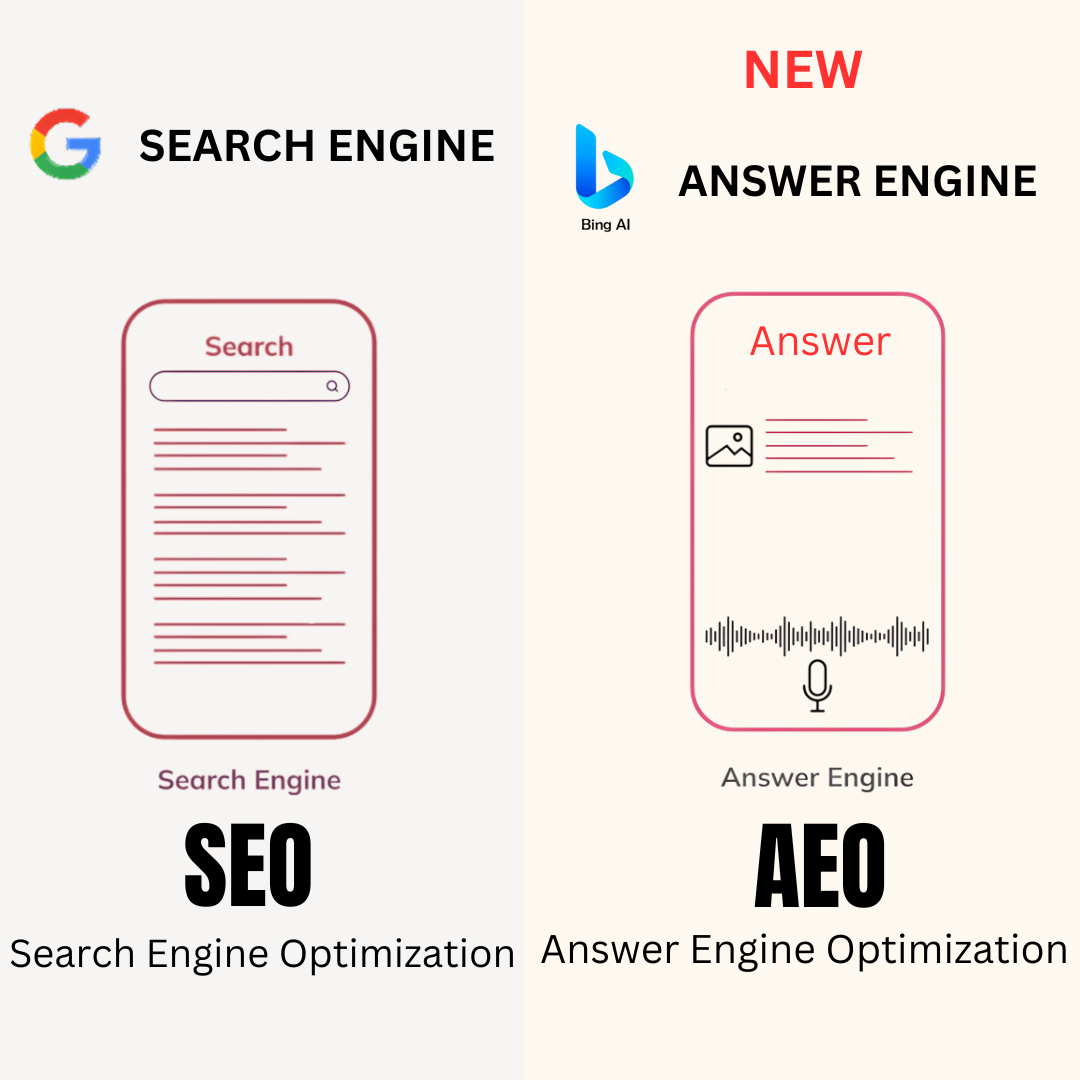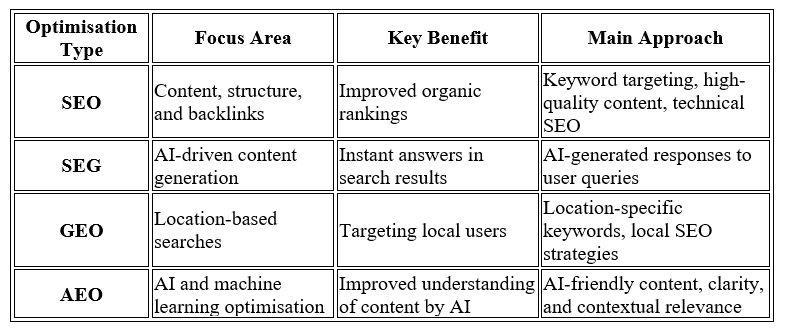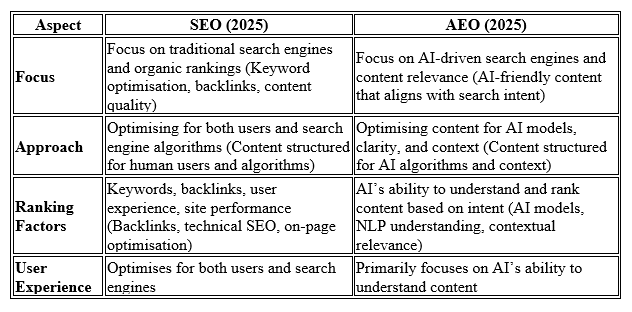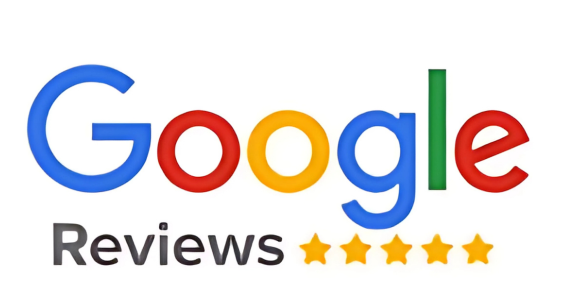The Future of Search Engines in 2025 SEO vs AEO


Introduction
The world of search engine optimisation (SEO) is evolving rapidly, and with it, new methodologies are emerging to help websites rank better in search results. In 2025, we’re likely to see an even bigger shift with the rise of Search Experience Generative (SEG), Geospatial Search Optimisation (GEO), and Artificial Intelligence Optimisation (AEO). These new optimisation techniques are reshaping how we approach search and how search engines like Google rank pages.
In this article, we’ll take a deep dive into what SEO, SEG, GEO, and AEO are, how they differ, and why they’re important for businesses and marketers in 2025. We’ll also provide you with the tools and insights you need to prepare for these changes and stay ahead of the curve.
Table of Contents
- What is SEO?
- The Importance of SEO in 2025
- Key Components of SEO
- What is SEG?
- How SEG Works
- The Role of AI in Search
- What is GEO?
- The Rise of Geospatial Search
- How to Optimise for GEO
- What is AEO?
- Understanding AI-Optimisation
- The Future of AEO in 2025
- Comparing SEO, SEG, GEO, and AEO
- Key Differences in Optimisation Strategies
- Visual Comparison Table
- How to Prepare for the Future of Search Engines in 2025
- Building an SEO-Friendly Website
- Using AI for Content Optimisation
- Embracing Local Search Strategies
- Conclusion
- FAQs
- What is the Major Difference in SEO Between 2024 vs 2025?
- What Are the Major Differences Between SEO and AEO?
- How can I optimise for GEO in 2025?
- How can I optimise my content for AI?
- What are the major differences between SEO and AEO?
- Which is the Winner in 2025: SEO or AEO?
- Is AEO important for ranking in 2025?
What is SEO?
Search Engine Optimisation (SEO) is the process of improving the visibility of a website or webpage on search engines like Google. It involves making sure that your content is relevant, valuable, and easily discoverable to both users and search engine algorithms.
The Importance of SEO in 2025
In 2025, SEO will remain a foundational element of digital marketing. Search engines are increasingly becoming smarter, focusing more on user intent and providing richer, more accurate search results. SEO ensures that your content remains visible and ranks well in an ever-changing algorithmic landscape.
Key Components of SEO
- On-page SEO: Ensuring that your content is optimised with the right keywords, meta tags, headings, and high-quality content.
- Off-page SEO: Building backlinks from authoritative sites to improve your domain’s credibility and authority.
- Technical SEO: Ensuring that your website is user-friendly, mobile-responsive, and technically sound for crawling and indexing by search engines.
What is SEG?
Search Experience Generative (SEG) is a new, AI-driven approach to search engines where AI models generate direct responses to user queries, often in the form of detailed answers, summaries, or even entire paragraphs. It’s shifting the way users interact with search engines, reducing the need to click on individual search results.
How SEG Works
SEG uses advanced AI models, such as large language models (LLMs), to understand search intent and generate content that answers queries immediately in the search engine results pages (SERPs). This means users might no longer need to visit websites for information as the answer is already presented in the search result.
The Role of AI in Search
AI is transforming search results, offering users direct, comprehensive answers in a conversational format. For example, instead of displaying links to multiple websites, SEG might give you a full paragraph or a list summarising the best marketing strategies for a business.
What is GEO?
Geospatial Search Optimisation (GEO) is a strategy that focuses on improving your website’s visibility for local or geographically-based searches. This is increasingly important in 2025 as more people use their devices to search for local businesses, services, or places nearby.
The Rise of Geospatial Search
Geospatial search is driven by the user’s location, and it’s becoming more accurate with the help of GPS and other location-based technologies. For example, if someone searches for “best pizza near me,” search engines will provide results based on the user’s physical location.
How to Optimise for GEO
- Local Keywords: Use city or neighbourhood names in your content and meta tags.
- Google My Business: Ensure your business is listed and regularly updated on Google My Business.
- Customer Reviews: Encourage satisfied customers to leave positive reviews, as this improves local rankings.
What is AEO?
Artificial Intelligence Optimisation (AEO) involves optimising your content specifically for AI-driven search engines. It’s about creating content that is easy for AI to process, understand, and rank. With AI becoming more central to how search engines rank websites, AEO is crucial for businesses wanting to stay competitive.
Understanding AI-Optimisation
AEO is a result of advancements in machine learning and natural language processing (NLP), where AI tools like Google’s BERT and MUM better understand context, intent, and language nuances. Content needs to be clear, direct, and easy for AI systems to analyse in order to rank well.
The Future of AEO in 2025
As AI continues to evolve, AEO will be a fundamental strategy in ensuring your content is indexed and understood by the algorithms. This means focusing on providing high-quality, contextually relevant content that answers questions directly and is written in a way that AI can process efficiently.
Comparing SEO, SEG, GEO, and AEO
Let’s take a closer look at how these four optimisation strategies compare:
Key Differences in Optimisation Strategies
- SEO focuses on improving your website’s visibility using traditional methods like keyword research, content optimisation, and backlinks.
- SEG is focused on generating content directly within search results using AI, shifting away from traditional SEO methods.
- GEO targets location-based searches, aiming to help businesses rank for geographic terms like city or neighbourhood names.
Visual Comparison Table

How to Prepare for the Future of Search Engines in 2025
To keep up with the changing search engine landscape, businesses must adapt to these new strategies. Here’s how to stay ahead of the curve:
Building an SEO-Friendly Website
Ensure your website is mobile-responsive, loads quickly, and is easy for both users and search engines to navigate. Optimising for traditional SEO will continue to be important, so focus on improving user experience (UX) and site performance.
Using AI for Content Optimisation
Use AI tools to help generate and optimise content. AI can help create more relevant, on-demand content that answers user queries, aligns with search intent, and ranks higher.
Embracing Local Search Strategies
Local search is growing, so ensure your website is optimised for geospatial search by adding location-specific keywords, creating a Google My Business profile, and gaining local reviews.
FAQs
Q1. What is the major difference in SEO between 2024 vs 2025?
In 2025, SEO will need to focus more on AI-driven optimisation, content clarity, and user intent, rather than just keyword density and traditional link-building strategies. AI tools and algorithms will become more advanced, requiring businesses to adapt to new optimisation methods that focus on context and relevance.
Q2. What is the difference between SEO and SEG?
SEO focuses on optimising your content for search engines’ algorithms, while SEG generates content directly within search results using AI, providing immediate answers to queries.
Q3. How can I optimise for GEO in 2025?
Optimise for GEO by using location-specific keywords, claiming your Google My Business listing, and gathering local reviews to boost your visibility in location-based searches.
Q4. How can I optimise my content for AI?
To optimise your content for AI, focus on clarity, structure, and relevance. Write with intent and context in mind, and ensure your content directly answers the questions or needs of the user. Using natural language and optimising for voice search can also be beneficial.
Q5. What are the major differences between SEO and AEO?
AEO focuses on optimising content specifically for AI-driven search engines. This means crafting content that is not only useful for users but also easily processed by AI models, allowing them to rank it higher in search results.
Q6. Which is the Winner in 2025: SEO or AEO?

In 2025, AEO is likely to become the winner for businesses looking to future-proof their SEO
strategies. As AI continues to evolve, optimising content for AI understanding will be crucial. However, traditional SEO will still play a significant role for businesses that want to stay competitive in organic search.
Q7. Is AEO important for ranking in 2025?
Yes, as AI becomes more prominent in search engines, AEO
Conclusion
The search engine landscape is changing quickly, and understanding the key differences between SEO, SEG, GEO, and AEO is essential for anyone looking to maintain a strong digital presence in 2025. SEO remains important for traditional search rankings, but with the rise of AI-driven search experiences, it’s crucial to adapt to new trends like SEG and AEO. Geospatial search, on the other hand, is becoming increasingly vital for local businesses. Embrace these changes to stay ahead of the competition and future-proof your digital marketing strategies.



